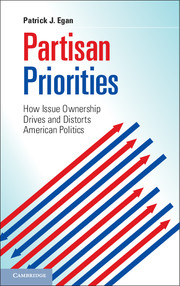4 - Ruling Out the Policy and Performance Hypotheses
Published online by Cambridge University Press: 05 August 2013
Summary
We have seen that a consensus exists in the United States across the ideological spectrum that Washington should address a broad set of national goals with spending and government action. In the previous chapter, we saw that over the past four decades, Americans have consistently associated most of these goals with one party or another. Here I begin to investigate why these associations persist so strongly over time. Political scientists have ascribed the sources of the parties’ issue ownership to any or all of three explanations, hypothesizing that parties own issues because the public prefers their policies, their performance, or their priorities to those of the other party. In this chapter, I rule out the first two explanations, showing that the policy and performance hypotheses are profoundly unable to explain why parties own issues.
The chapter begins with a short discussion of why the questions that motivate this book require a focus on issue ownership at the aggregate, rather than the individual, level of analysis. Turning to the policy hypothesis, I show that policy preferences – as measured by four decades of survey items on which Americans have placed the parties and themselves on issue-specific scales – are remarkably unrelated to issue ownership. Americans do not particularly favor Democratic policies on Democratic-owned issues such as health care or jobs, nor do they favor Republican policies on the military or crime. The chapter then examines the performance hypothesis by comparing over-time issue ownership data with objective indicators of national conditions – such as crime, air quality, taxes, and health outcomes. This analysis shows that the parties’ ownership of most issues is completely unrelated to whether conditions on that issue actually improve when they hold power in Washington. Remarkably, Americans’ stated beliefs that one party is better able to “handle” a particular issue than the other have little to do with whether conditions actually improve on the issue when the trusted party holds power.
Information
- Type
- Chapter
- Information
- Partisan PrioritiesHow Issue Ownership Drives and Distorts American Politics, pp. 79 - 124Publisher: Cambridge University PressPrint publication year: 2013
